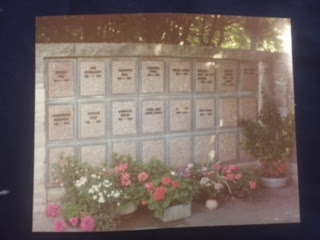Ferdinand Ankenbrand was born on 26 July 1913, right before World War I began in Europe. As a child growing up in the post World War I era, the war lasted from 1914-1918, my great grandfather did not have much. In fact, stories of his childhood are pretty much lost as it was turbulent and he chose not to talk about them with my Oma, his daughter.
From what I do know, Ferdinand was an orphan by the age of 11; his father most likely fought for the German Army in World War I and I have no idea what caused his mother to pass away while he was so young. No one in my family knows anything else beyond these few facts about Ferdinand's parents, everyone who knew them is either deceased or I have never met because they live in Germany. It's common for that side of the family to not talk about ancestors or anything pertaining to family life really for that matter.
 |
My great-grandfather and some of the men he fought with.
He is pictured top row, left.
|
As a German citizen, you are required to sign up for a draft much like the one we practice in America. This is what happened with my great grandfather, during World War II Germany issued a draft calling all the men to come to war; Ferdinand was drafted in 1938. He answered the call to avoid repercussions to his wife, Pauline. Ferdinand excelled in the German Army eventually becoming a sergeant. I want to clear something up, in no way did he work in concentration camps or any job that dealt with them; he merely was a fighting solider on the fields.
In July of 1945, Ferdinand was fighting in Italy when American troops captured him and he became a prisoner of war and was transported to America first going to Alabama then landing at Camp McCain in Mississippi. During his stay at Camp McCain, he had quite the unusual experience.
The German POW's at Camp McCain, were "treated like friends," he said during an interview when he later came back to visit. They did not have to do extremely hard labor or have unusual punishment because they were part of the German Army. As a POW, he picked cotton and did other work in the fields of nearby farmers who would return them to camp at the end of the day. He was also allowed to keep somewhat of a higher positon because of his sergeant status; he was the "commander" of the around 30 men in his barrack.
Through all of this, my great grandmother Pauline had no clue where her husband was. She was first told that Ferdinand was only missing-in-action, or MIA; she later just assumed his was killed-in-action because she never received the POW information card the American government was supposed to send. She waited quite some time to be reunited with him, but eventually, in October of 1947 they were finally together again.
Little is known about why it took so long after the war ended for them to be together again but we do know Ferdinand spent some time in England working in shipyards after being released from Camp McCain in 1946 right after the war ended.
 |
This is my great grandfather and his wife, Pauline.
This was at their home in Gochsiem, Germany.
|
Two years later they would have a daughter, their only child and my Oma, Renate. She has never really talked about growing up in a post-war reconstructing country so I do not know much about how her childhood was different from her fathers'.
Ferdinand and Pauline would later return to Camp McCain while visiting family here in America. That event was quite big for the camp as many of the POW's returned at some point because they did not have feelings of bitterness and hatred for the American soldiers there.
Not much more is known from their by any of my family that are willing to reminisce about ancestors. My mother, who was born in Germany, was able to visit only a couple of times when she was very young and does not remember much.
 |
The only photo of my great grandfathers burial place. He's urn is placed in the
first spot on the left of the second row.
|
My great-grandfather passed away at the age of 82 on 3 December 1995 in Gochshiem, Germany
his hometown. He perished due to natural causes along with the complications from diabetes; he had several amputations in his later years which eventually shocked his system so terribly he never made a recovery. He was cremated and placed into the only cemetery of the city, because this is so, the cemetery is unnamed and impossible to find online.
Not much more of him is ever talked about. I think it would have been very interesting to meet him when I travelled to Germany. The German part of my heritage has always intrigued me. maybe one day I can explore more of my family tree and visit again.
No comments:
Post a Comment